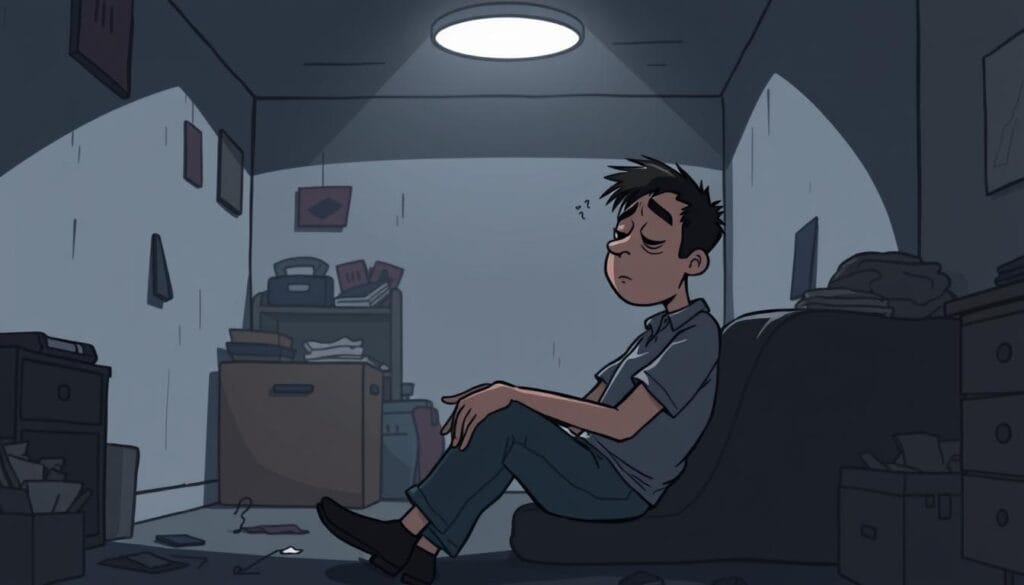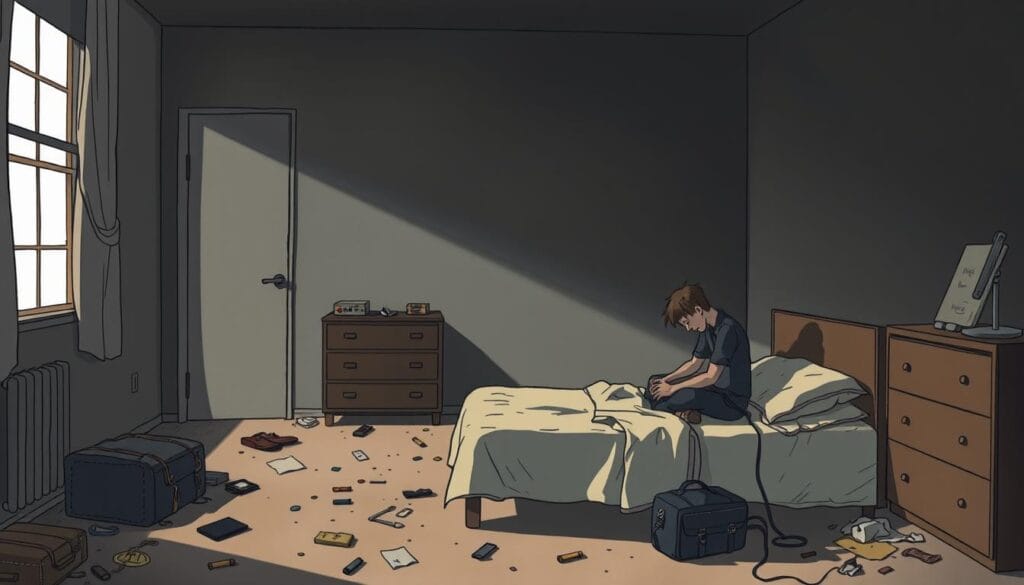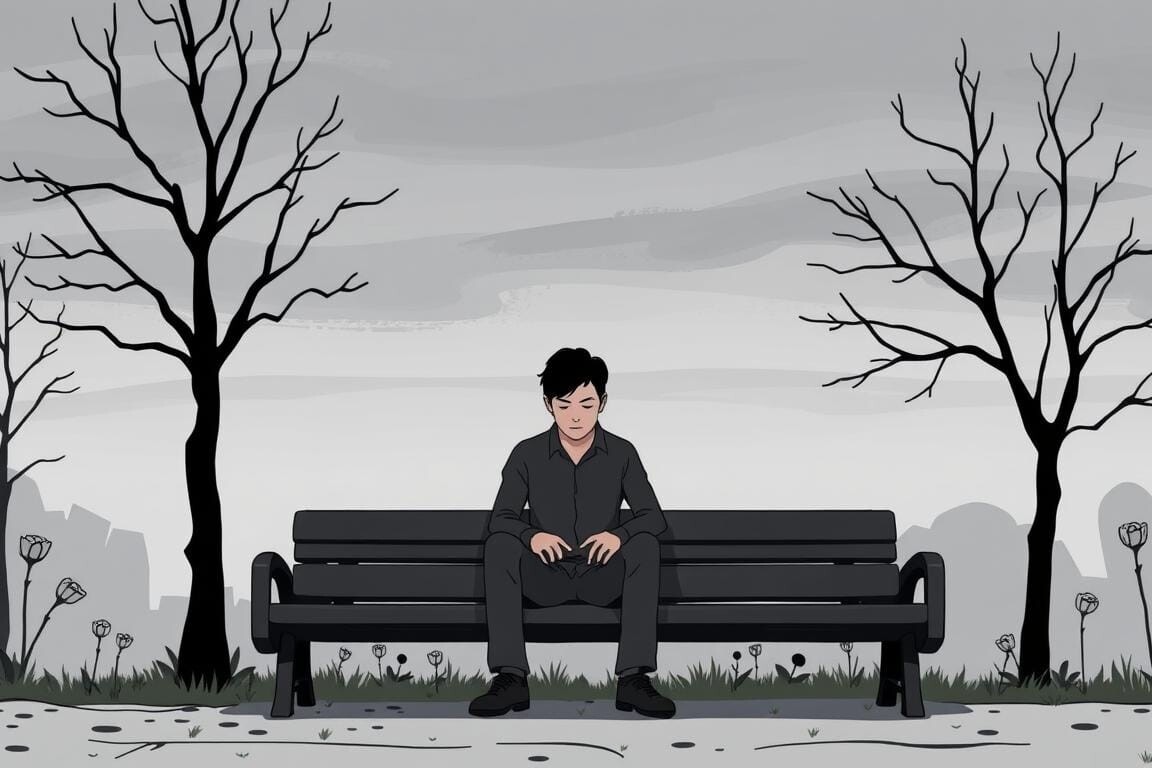Depression is a complex mental health issue that can affect anyone. But men often find it hard to recognize and seek help. Dr. Chandril Chugh, a well-known brain specialist has worked to understand and help men with depression.
This guide will explore why men face stigma in mental health. We’ll look at the signs of depression in men and how to support them. By breaking down myths, we aim to help men seek help and recover.
Depression is treatable, and men can get better with the right support. Let’s talk about how to help the men in your life. Together, we can help them find the courage to seek help.
Table of Contents
ToggleUnderstanding the Stigma: Why Men Struggle to Open Up
Men often face tough expectations and gender roles. These make it hard for them to share their feelings and get help for mental health. The “tough guy” idea, which values strength and not showing emotions, stops men from talking about depression and getting support.
Societal Expectations and Gender Roles
Societal stigma is a big reason men don’t talk about their mental health. Men are expected to be strong, independent, and in control of their emotions. Saying they’re depressed or anxious is seen as weak. This makes it hard for men to ask for help without being judged or laughed at.
The “Tough Guy” Mentality and Its Consequences
The “tough guy” idea is deeply rooted in society. It can have serious effects on men’s mental health. Men who follow this idea might feel too ashamed to show their feelings or get help. This can lead to untreated depression and even death by suicide.
According to the World Health Organization, men are more than twice as likely to die by suicide than women worldwide.
To fight this stigma, we need to change old gender norms. We must encourage open talks and help men focus on their health. By tackling these societal and cultural issues, we can make a better place for men to get the help they need.
Identifying the Signs of Depression in Men
Depression shows up differently in men and women. It’s key to spot the signs in men. Men often feel tired, have trouble sleeping, eat differently, and feel physical pain. These signs can be missed or misunderstood.
So, it’s important for family and doctors to know how depression looks in men.
Physical Symptoms: Fatigue, Sleep Issues, and More
Depression hits 1 in 8 men at some point. Men tend to show physical signs more than emotional ones. Here are some common physical signs:
- Persistent fatigue and lack of energy
- Difficulty falling asleep or staying asleep
- Changes in appetite, such as overeating or loss of appetite
- Unexplained physical aches and pains, such as headaches or digestive problems
Life challenges like losing a loved one, job loss, abuse, or stress at work can lead to depression in men. If you see these signs, talk to a doctor.

The Unique Challenges men in depression Face
Men with depression face special challenges that make their condition worse. They often feel pressured to be strong and not show their feelings. This fear of being seen as weak can stop them from getting help.
Depression can also affect men’s sense of self and their roles at home and work. They might feel like they’re not living up to being the strong provider. This feeling of failure can make them ignore their own mental health needs. The shame of having mental health issues can also make them feel isolated and less likely to seek help.
- Studies show that men’s fear of seeking help for depression comes from traditional masculine norms. These norms value strength, success, self-reliance, and hiding emotions.
- Men who got help for depression said it changed their views on depression. This shows how important it is to meet their specific needs.
- Fathers with mental health issues find it hard to be good parents because of depression. This can make their parenting worse and make the problem even bigger.
To help men with depression, we need a special approach. We must understand the pressures and expectations they face because of their gender. By creating a supportive and understanding space, we can help men focus on their mental health. This way, they can get the help they need to recover.
Coping Mechanisms: Unhealthy vs. Healthy Approaches
Men dealing with depression might use many coping strategies. Some are harmful, while others are helpful. It’s key to know the difference.
Substance Abuse and Other Risky Behaviors
Excessive drinking or drug use is a bad way to cope for men with depression. It can lead to addiction and make mental health worse. Other harmful behaviors, like gambling or self-harm, try to hide pain but make things worse.
Positive Coping Strategies: Exercise, Therapy, and Support
Healthy coping strategies can help manage depression. Exercise, like running or lifting weights, can boost mood and reduce stress. Therapy, whether alone or with others, offers tools to handle emotions.
Having a strong support network is also crucial. Friends, family, or groups can make men feel less alone and more hopeful.
It’s important to swap bad coping methods for good ones. Focus on self-care and getting the right help. This way, men can manage their depression and feel better overall.
The Impact of Depression on Relationships and Work
Depression can affect a man’s life in big ways. It can strain his relationships with loved ones. Symptoms like feeling distant and irritable can make it hard to connect with others.
At work, depression can also be a big problem. It can make it hard to focus and do well in your job. This can hurt your career.
Depression can make relationships tough. It can lead to problems with intimacy and trust. It can even cause the end of long-distance relationships.
At work, depression can cause problems too. It can make you tired and unable to concentrate. This can hurt your job performance.
But, there is hope. Getting help and building a support network can help. Healthy coping strategies can also make a big difference.
Men in depression: Breaking the Silence
We must end the silence around men’s depression. Society often expects men to be tough, making it hard for them to talk about their feelings. It’s time to start open conversations and help men get the support they need.
Encouraging Open Dialogue and Seeking Help
About 1 in 8 men deal with depression at some point. But, men are less likely to get diagnosed than women. This is because men are often taught to hide their feelings, leading to shame and fear of seeking help.
We need to make places where men can share their feelings safely. Doctors, support groups, and educational efforts are key. They help create a supportive space for men to focus on their mental health.
- Seeing a doctor is a sign of strength, not weakness.
- Start talking about mental health in families, workplaces, and communities.
- Stop thinking depression is only a “women’s issue.”
- Help men take the first step to talk to mental health experts or join groups.
By ending the silence and fostering empathy, we can encourage more men to open up. This will help them seek help and work towards a better future.

Treatment Options: Therapy, Medication, and Lifestyle Changes
If you’re a man struggling with depression, know that you have many treatment options. You can try therapy, medication, and lifestyle changes. These can help manage your symptoms and improve your wellbeing.
Cognitive-Behavioral Therapy and Its Benefits
Cognitive-behavioral therapy (CBT) is often recommended for men with depression. It helps you spot and change negative thoughts that lead to depression. Through CBT, you learn how to handle your emotions better and face problems head-on.
Research shows CBT can be very effective. Many men see a big drop in symptoms after 16-20 weekly sessions. A good therapist helps you understand your thoughts better and find healthier ways to deal with tough situations.
Medication is also key in managing depression. Antidepressants and mood stabilizers help balance brain chemicals that cause depression. It’s crucial to work with your doctor to find the right medication and dosage for you.
Finally, making healthy lifestyle choices can boost your recovery. Regular exercise, stress management, and good sleep habits can greatly improve your mood and wellbeing.
There’s no single way to treat depression in men. By trying therapy, medication, and lifestyle changes together, you can find the best way to heal and improve your life.
The Role of Family and Friends in Supporting Recovery
When a man is struggling with depression, family and friends play a big role. They offer emotional, practical, and social support. This helps him focus on his mental health and work towards wellness.
It’s key for family and friends to encourage open talk. A safe and non-judgmental space lets you share feelings and thoughts freely. This understanding helps you seek help when needed.
Your loved ones can also help set healthy boundaries. They remind you to take care of yourself and stick to your treatment plan. This support is crucial, even when it’s hard.
Being part of your treatment is very helpful. Family and friends can go to therapy with you. They learn about depression and how to support you. This strengthens your support network.
Remember, your recovery is a journey. The support of your loved ones is crucial. Together, you can empower each other to prioritize mental health and find healing.
Family and friends support for men with depression can change the game. Embrace their support and start your journey to help men with depression.

Preventive Measures: Fostering Mental Well-being
Good mental health is more than just treating depression. Taking steps early can stop depression in men. Stress management is key, along with regular exercise and finding a balance in life.
Stress Management, Self-Care, and Mindfulness
Self-care is important too. This includes enough sleep, eating well, and doing things you enjoy. Mindfulness helps men stay aware and in control of their feelings. This is crucial for mental health.
- Engage in regular physical activity to manage stress and boost mood
- Practice relaxation techniques, such as deep breathing, meditation, or yoga
- Prioritize a healthy work-life balance to prevent burnout
- Ensure adequate sleep, a nutritious diet, and time for leisure activities
- Incorporate mindfulness practices to enhance self-awareness and emotional regulation
By focusing on prevention, men can improve their mental health. These steps help men stay strong against depression. They also show others the importance of mental health.
Success Stories: Men Who Have Overcome Depression
Beating depression is a big journey. Many men have won this fight. Their success stories of men with depression give hope to those still fighting.
Sam, a 26-year-old MA student, battled anxious depression since his teens. He even thought about suicide and hurt himself. But he didn’t give up. He got help and now excels in school and life.
Max, a 26-year-old who works in charity calls, also fought depression. It started in his teens and got worse after big life changes. Therapy and support groups helped him find his way again.
Even famous athletes like Olympic champion Michael Phelps have faced depression. In 2004, Phelps hit rock bottom. But he got better with therapy, meds, and lifestyle changes.
These men show us the strength of being open, resilient, and seeking help. Their stories encourage others to start their own journey to better mental health.

Recovery isn’t always easy. Men with depression face special challenges. Yet, these stories show that with the right support and a strong will, anyone can beat depression.
Conclusion: Embracing Vulnerability and Seeking Help
As we wrap up our look at men’s mental health, the message is clear. Being open and seeking help shows strength, not weakness. It’s time to break down the old ideas that keep men from talking about their feelings.
Letting go of the need to be tough and being honest with yourself is a big step. It’s the first step towards feeling better. Getting help from professionals and building a strong support network can help you face the challenges of depression.
Your mental health is as vital as your physical health. Taking care of your feelings, finding healthy ways to cope, and working on your recovery can lead to a better future. By being open and seeking help, you’re not just helping yourself. You’re also inspiring others to do the same.
FAQ
What are the societal expectations and gender roles that prevent men from seeking help for depression?
Men often feel they must be strong and not show weakness. This idea makes it hard for them to talk about depression. It’s a big part of why men struggle to get help.
How can depression manifest differently in men compared to women?
Depression can show up in different ways for men and women. Men might feel tired, have trouble sleeping, or feel physical pain. These signs are often missed or misunderstood.
What unique challenges do men with depression face?
Men with depression face many challenges. They might feel they can’t show weakness or burden others. Depression can also affect their identity and work life, making recovery harder.
What are the differences between healthy and unhealthy coping mechanisms for men with depression?
Men might try to hide their pain by using drugs or taking risks. But, healthier ways like exercise and talking to someone can help them feel better.
How can depression impact a man’s personal and professional life?
Depression can hurt a man’s relationships and work life. It can make it hard to keep up with work and connect with loved ones. It’s important to talk about mental health at work.
What are the treatment options available for men struggling with depression?
Men can get help through therapy, medicine, and lifestyle changes. Therapy helps them change their thinking and face fears. Medicine and healthy habits also help manage symptoms.
How can family and friends support men with depression?
Family and friends are key in helping men with depression. They can offer emotional support and encourage seeking help. Being involved in treatment helps men feel supported.
What are some preventive measures men can take to promote their mental well-being?
Men can stay mentally healthy by managing stress and practicing self-care. This includes exercise, relaxation, and hobbies. Mindfulness helps with emotional control and purpose.
Can you share some inspiring success stories of men who have overcome depression?
The article shares stories of men who beat depression. These stories show the power of seeking help and finding new ways to cope. They offer hope and show that recovery is possible.
Source Links
About The Author

Medically reviewed by Dr. Chandril Chugh, MD, DM (Neurology)
Dr. Chandril Chugh is a U.S.-trained, board-certified neurologist with expertise in diagnosing and managing neurological disorders, including migraines, epilepsy, Parkinson’s disease, and movement disorders. His clinical focus includes evidence-based neurological care and patient education.
All content is reviewed for medical accuracy and aligned with current neurological guidelines.




